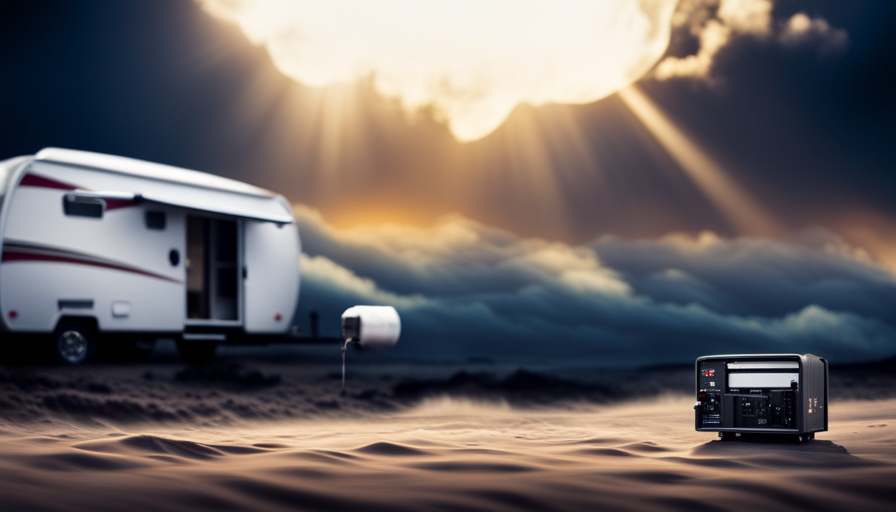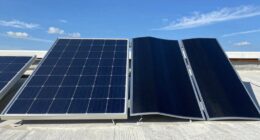Searching for the ideal spot to store your cherished camper? Search no more! We offer a wide array of storage solutions to ensure your camper remains protected and secure.
Whether you’re a full-time RVer or just looking for a temporary spot, we know exactly where to store your camper while you’re not on the road.
Finding the ideal storage location for your camper is crucial to ensure its longevity and protect your investment. Luckily, there are various options available to suit every need and preference.
From dedicated RV storage facilities with top-notch security to private properties offering convenient rental spaces, we’ve explored it all.
In this article, we’ll delve into the world of camper storage and guide you through the pros and cons of each option. We’ll discuss the benefits of indoor versus outdoor storage, the perks of storing at campgrounds or RV parks, and even explore self-storage units and home storage solutions.
So, let’s dive in and discover the perfect spot to store your camper with peace of mind.
Key Takeaways
- There are various storage options available for campers, including dedicated RV storage facilities, indoor storage, outdoor storage, renting space on private properties, storing on public lands, storing at campgrounds or RV parks, self-storage units, and home storage options.
- The ideal storage location is important for the longevity and protection of the camper.
- Dedicated RV storage facilities offer convenience, peace of mind, security features such as gated access and surveillance cameras, as well as additional amenities like wash stations and on-site repairs.
- Factors to consider when choosing between indoor and outdoor storage include protection from elements, climate control, easy access, affordability, and security measures.
Dedicated RV Storage Facilities
If you want to keep your camper safe and secure, you’ll love the convenience and peace of mind that dedicated RV storage facilities can provide. RV storage facilities are specifically designed to accommodate campers and offer a range of services to ensure the protection of your vehicle.
These facilities typically have large, designated spaces for storing campers, complete with security features like gated access, surveillance cameras, and on-site staff. One of the main advantages of using RV storage facilities is the added security they offer. With these facilities, you can rest assured that your camper is protected from theft, vandalism, and the elements.
Additionally, many RV storage facilities also offer additional amenities such as wash stations, dumping stations, and even on-site repairs, making it convenient for campers to maintain and service their vehicles. The cost of storing a camper in dedicated RV storage facilities can vary depending on factors such as location, size of the storage space, and the amenities provided.
However, when compared to other storage options, such as renting a traditional storage unit or keeping your camper at home, dedicated RV storage facilities often offer competitive rates. Now let’s dive into the next section, where we’ll explore the advantages and considerations of indoor vs. outdoor storage options for your camper.
Indoor vs. Outdoor Storage Options
When it comes to storing your camper, there are advantages to both indoor and outdoor options. Indoor storage provides excellent protection from the elements, ensuring that your camper stays in top condition.
On the other hand, outdoor storage offers easy access and affordability, allowing you to quickly retrieve your camper whenever you need it.
When choosing between indoor and outdoor storage, it’s important to consider factors such as the climate in your area, the level of security provided, and your budget.
Advantages of indoor storage for camper protection
Storing your camper indoors provides a safe haven, shielding it from the elements and giving you peace of mind. One of the main advantages of indoor storage is the benefits of climate control. With indoor storage, you can control the temperature and humidity levels, ensuring that your camper is protected from extreme weather conditions that can cause damage over time.
Additionally, indoor storage offers security advantages. Many indoor storage facilities have strict security measures in place, such as surveillance cameras, gated access, and on-site staff, giving you the confidence that your camper is safe and secure.
Now, let’s transition to the next section about the benefits of outdoor storage for easy access and affordability.
Benefits of outdoor storage for easy access and affordability
Outdoor storage offers convenient access and cost savings, making it a practical choice for many camper owners. When it comes to RV storage benefits, outdoor options provide easy accessibility for those spontaneous road trips without the hassle of maneuvering through indoor storage facilities. With outdoor storage, you can simply drive up to your camper and hit the road.
Additionally, outdoor storage tends to be more affordable compared to indoor options. This means you can save some extra cash for your adventures. Many outdoor storage facilities offer flexible rental terms, allowing you to choose the duration that suits your needs.
However, before making a decision, it’s important to consider factors such as climate conditions and security measures to ensure the safety of your camper. Transitioning into the next section, let’s explore some factors to consider when choosing between indoor and outdoor storage.
Factors to consider when choosing between indoor and outdoor storage
One important factor to consider when deciding between indoor and outdoor storage is the level of protection provided for your camper. Indoor storage offers the highest level of protection from the elements, including extreme weather conditions, UV rays, and potential vandalism. It also provides a secure and controlled environment, reducing the risk of theft. However, indoor storage tends to be more expensive compared to outdoor storage options.
Outdoor storage, on the other hand, is more affordable and readily available. While it may not offer the same level of protection as indoor storage, it still provides a safe and convenient option for storing your camper. It’s essential to weigh the pros and cons of both options and consider your budget and specific needs.
Transitioning to renting space on private properties allows for more flexibility and potential cost savings.
Renting Space on Private Properties
To find a suitable place for your camper, consider renting space on privately owned properties. Renting driveway space is a popular option for camper storage. Many homeowners have extra space in their driveways that they’re willing to rent out to campers. This can be a convenient and cost-effective option, as it allows you to store your camper close to home and easily access it whenever you need to.
Another option to consider is storage on public lands. Some areas allow campers to park their vehicles on designated public lands for a fee. This can be a great option if you prefer to store your camper in a natural setting, such as a forest or a beach.
When renting space on private properties or storing on public lands, it’s important to consider factors such as security, accessibility, and cost. Make sure the location is secure and has adequate measures in place to protect your camper from theft and damage. Also, consider how easily you can access the storage space and whether it’s convenient for your needs. Finally, compare prices and choose an option that fits within your budget.
Transitioning to the next section, storing at campgrounds or RV parks provides additional amenities and services for camper owners.
Storing at Campgrounds or RV Parks
If you’re looking for a convenient and hassle-free option, consider staying at campgrounds or RV parks that offer storage services for your camper. These places are perfect for both long-term storage and overnight stays.
Many campgrounds and RV parks have designated areas where you can safely park and store your camper when you’re not using it. They often have secure facilities with surveillance cameras and access control systems to ensure the safety of your camper. Some campgrounds even offer additional services such as regular maintenance and cleaning for your camper, so you can rest assured that it’ll be well taken care of while it’s stored.
Storing your camper at a campground or RV park has its advantages. Firstly, it provides a convenient solution for those who frequently travel with their campers. You can simply drive to the campground or RV park whenever you want to use your camper and leave it there when you’re done.
Secondly, it eliminates the need for you to find separate storage facilities, saving you time and effort. Lastly, staying at a campground or RV park gives you the opportunity to socialize and connect with other campers who share the same interests.
When it comes to storing your camper, campgrounds and RV parks are a great option. However, if you’re looking for a more independent and flexible storage solution, self-storage units might be the way to go.
Self-Storage Units
Consider renting a self-storage unit for a flexible and independent solution that gives us peace of mind and the freedom to protect our cherished camper. Self-storage options are a great alternative to storing our camper at campgrounds or RV parks.
These units are specifically designed to accommodate vehicles of various sizes, including campers, and provide a secure environment to keep them safe.
When looking for a self-storage unit, there are a few cost considerations to keep in mind. The rental fees will depend on factors such as the size of the unit, location, and amenities offered. It’s important to choose a unit that fits our camper comfortably while also considering our budget. Some facilities may offer additional services like 24/7 access, surveillance cameras, and climate control, which can impact the cost.
In addition to cost, it’s crucial to assess the security measures implemented by the self-storage facility. Look for features such as gated access, well-lit areas, and individual unit locks to ensure the safety of our camper.
Transitioning into the subsequent section about home storage solutions, it’s worth exploring other options that may be more convenient and cost-effective for long-term storage.
Home Storage Solutions
Looking for a more convenient and cost-effective solution for long-term storage of our camper? What are some home storage options that can provide the same level of security and protection?
When it comes to home organization and space-saving solutions, there are several options available that can help maximize storage space for your camper.
-
Garage Storage Systems: Installing a garage storage system can be a game-changer when it comes to storing your camper at home. With customizable shelves, hooks, and cabinets, you can easily create designated spaces for your camper accessories and gear.
-
Outdoor Storage Sheds: Investing in an outdoor storage shed can provide a dedicated space for your camper while keeping it protected from the elements. Look for sheds with reinforced flooring and secure locking systems to ensure maximum security.
-
Carport or RV Port: If you have enough space in your yard, consider installing a carport or RV port specifically designed for storing campers. These structures provide shelter and protection from the weather, while also keeping your camper easily accessible for future trips.
By incorporating these home storage solutions into your space, you can efficiently store your camper while also maintaining a clutter-free and organized home. With the right tools and systems in place, you can enjoy peace of mind knowing that your camper is safely stored and ready for your next adventure.
Frequently Asked Questions
Can I store my camper at a friend or family member’s property?
Storing your camper at a friend or family member’s property can be a convenient option. However, there are pros and cons to consider.
On the positive side, it can save you money on storage fees and provide easy access to your camper. Additionally, you may feel more comfortable knowing that someone you trust is keeping an eye on it.
However, keep in mind that this arrangement could strain your relationship if any issues arise. It’s important to establish clear expectations and responsibilities to avoid any potential conflicts.
When it comes to storing a camper, there are numerous benefits to choosing a covered facility. Firstly, it provides protection from the elements, keeping your camper safe from rain, snow, and harsh sunlight.
Secondly, it helps prevent damage caused by pests or rodents.
Additionally, a covered facility offers enhanced security, reducing the risk of theft or vandalism.
When selecting a long-term camper storage option, factors to consider include location, cost, accessibility, and amenities provided.
Are there any restrictions or regulations when storing my camper at a campground or RV park?
When storing your camper at a campground or RV park, it’s important to be aware of the various restrictions and regulations in place. These can vary depending on the specific location, but common restrictions may include limitations on the size or type of camper allowed, rules regarding noise levels and quiet hours, and guidelines for waste disposal.
Additionally, some RV parks may have specific regulations regarding the length of time a camper can be stored on-site. It’s always best to check with the campground or RV park directly to ensure compliance with their regulations.
Storing your camper is like finding a safe haven for your adventurous spirit. When it comes to storing your camper, there are distinct benefits to both indoor and outdoor options.
Indoor storage protects your camper from harsh weather conditions and potential theft. On the other hand, outdoor storage might be more budget-friendly.
To find affordable options, consider joining RV clubs or searching for local storage facilities. Don’t forget to inquire about security measures and accessibility when making your decision.
Can I store my camper at a storage facility that specializes in boat storage?
Yes, you can definitely store your camper at a storage facility that specializes in boat storage. These facilities offer many benefits for camper owners, such as secure and gated premises, specialized storage options for various sizes of campers, and often have additional amenities like electricity hookups and water access.
However, if you’re looking for alternative storage options, you can also consider RV storage facilities, self-storage units, or even renting a private space on someone’s property.
Can I Winterize My Camper While Storing It?
Yes, you can winterize your camper while storing it. Properly winterizing your camper is crucial to protect it from freezing temperatures and prevent any costly damages. Ensure all water systems are drained completely and add antifreeze to prevent any residual water from freezing. Cover the camper with a breathable cover to keep it safe from the elements during the winter months.
Conclusion
In conclusion, finding the perfect storage solution for your camper requires careful consideration of various options.
Dedicated RV storage facilities offer secure and convenient spaces, while indoor storage protects your camper from the elements.
Renting space on private properties can be cost-effective, and storing at campgrounds or RV parks can provide easy access during your travels.
Alternatively, self-storage units offer flexibility and convenience.
Lastly, home storage solutions can be a great option if you have enough space.
Just like finding a cozy home for your camper, finding the right storage is essential to ensure its safety and longevity on the road.
So, let your camper find its own little sanctuary, where it can rest and be ready for your next adventure.










